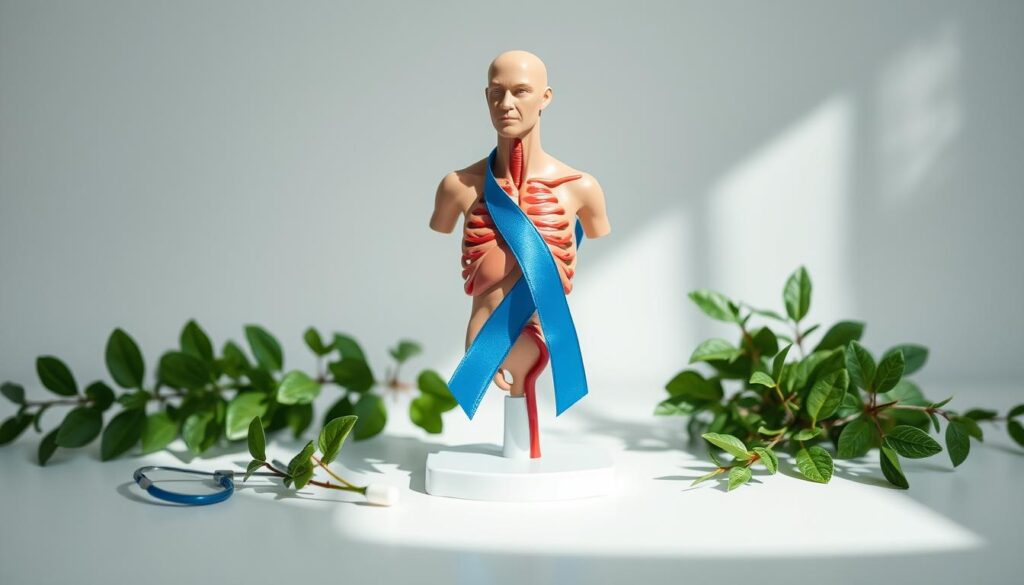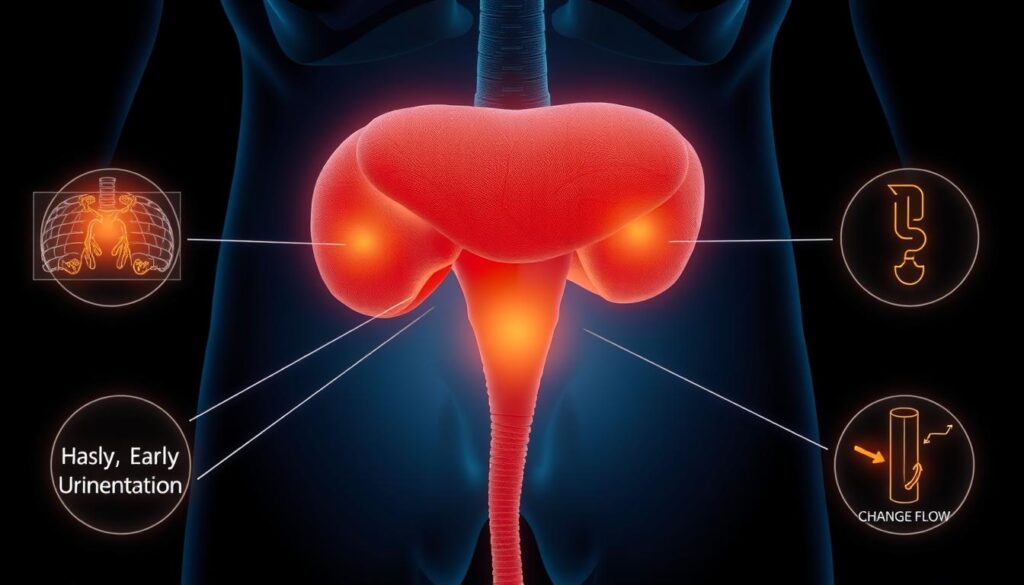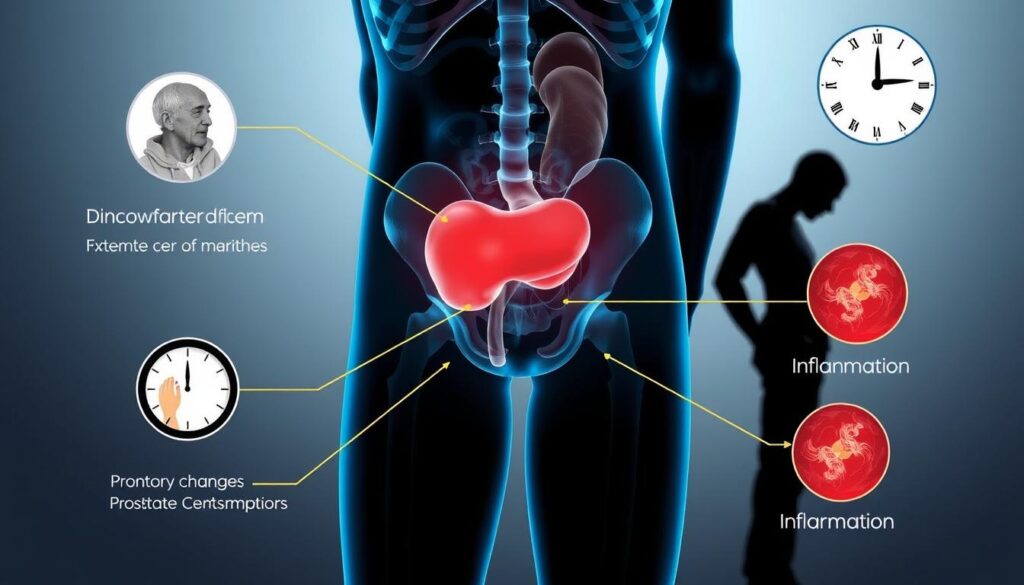Prostate Health: Early Warning Signs You Should Never Ignore
Prostate Health: Early Warning Signs You Should Never Ignore can help protect against advanced issues. Learn to spot the key symptoms early on.

Imagine sitting in a waiting room, looking at magazines. You hear two men talking about their health check-ups. One says he found out he had early prostate issues but caught it early.
His story makes his friend talk about his own worries about prostate health. This talk is a big reminder: don’t ignore early signs of prostate health. Taking care of your prostate is key for men’s health. It helps avoid serious problems later on.
In today’s world, we often ignore our body’s signals. Spotting early warning signs is very important. It’s crucial to know about your prostate health. This knowledge helps you act fast before problems get worse.
Key Takeaways
- Prostate health is vital for overall men’s health.
- Being aware of early warning signs can lead to timely interventions.
- Proactive health measures can protect against advanced issues.
- Open conversations about health can shed light on personal experiences.
- Understanding prostate health encourages you to take charge of your wellbeing.
Understanding Prostate Health
To understand prostate health, we need to know about the prostate’s anatomy. It’s a key part of the male body. A healthy prostate helps with sex and going to the bathroom.
What is the Prostate?
The prostate is a small gland, like a walnut, below the bladder. It wraps around the urethra, which carries urine. The prostate makes seminal fluid, which helps sperm.
This fluid is important for making babies. So, the prostate is very important for health.
The Role of the Prostate in Men’s Health
A healthy prostate helps with sex and going to the bathroom. Problems can cause trouble with these things. Knowing about the prostate helps find health issues early.
Prostate Problems: What You Should Know
It’s important to know about prostate problems for men’s health. Issues like BPH, prostatitis, and prostate cancer can really affect your life. Knowing the symptoms and how to get diagnosed can help a lot.
Common Prostate Conditions
There are many types of prostate problems. Here are some common ones:
- Benign Prostatic Hyperplasia (BPH): This is when the prostate gets too big and makes it hard to pee.
- Prostatitis: It’s when the prostate gets inflamed, causing pain and trouble with peeing.
- Prostate Cancer: This is a serious cancer that needs to be caught early to treat well.
Each problem has its own signs and problems. So, it’s key to watch your health and see a doctor if you notice anything off.
Diagnosis of Prostate Issues
Doctors use different ways to find out what’s wrong with the prostate. Here are some common methods:
- Physical Exams: A DRE is used to feel for any oddities in the prostate.
- Blood Tests: The PSA test checks for signs of prostate trouble.
- Imaging Studies: Ultrasounds or MRIs give clear pictures of the prostate.
Knowing about these tests can help you understand how to find and deal with prostate problems.
Prostate Health: Early Warning Signs You Should Never Ignore
Spotting early signs of prostate problems is key to your health. It lets you get medical help fast. Look out for changes in how you pee, pain when you pee, or blood in your pee. Fixing these problems quickly is very important for your health.
Identifying Symptoms Early
Knowing the signs of prostate trouble is crucial. Watch for:
- Needing to pee more, especially at night
- Struggling to start or stop peeing
- Weak or broken urine flow
- Pain when you pee or when you ejaculate
- Blood in your pee or semen
Spotting these signs early helps you act fast. Using good prostate health tips can help your treatment.
Importance of Prompt Action
Waiting too long can make problems worse. Acting quickly helps find and treat problems better. Your choices can really help. Regular check-ups and knowing your prostate health can greatly improve your results.

Prostate Cancer Symptoms to Watch For
Knowing the prostate cancer symptoms is key for early treatment. As cancer grows, spotting advanced signs is crucial. It’s important to know the symptoms and risk factors that could affect you.
Recognizing Advanced Symptoms
When prostate cancer gets worse, certain signs appear. These signs mean you need to see a doctor right away. Some common signs include:
- Significant weight loss without an obvious reason
- Extreme fatigue that doesn’t get better with rest
- Bone pain, especially in the back, hips, or pelvis
- Difficulty urinating, including pain or burning
- Seeing blood in urine or semen
Knowing these symptoms is important. They can mean the cancer has spread beyond the prostate.
Risk Factors for Prostate Cancer
Knowing the risk factors for prostate cancer helps you understand your risk. Some key risk factors are:
- Age: Risk goes up after 50
- Family history: If a relative had prostate cancer
- Ethnic background: African American men are at higher risk
- Lifestyle factors: Being overweight, eating few fruits and veggies, and not being active
Learning about these risk factors helps you stay aware of symptoms. It might also make you want to take health steps like regular check-ups and screenings.

| Symptom | Description | Potential Impact |
|---|---|---|
| Weight Loss | Unexplained reduction in body weight | May indicate cancer progression |
| Fatigue | Constant feeling of tiredness | Can affect daily activities |
| Bone Pain | Persistent pain in specific areas | Signals possible spread of cancer |
| Urinary Issues | Difficulty or pain while urinating | May suggest advanced tumors |
| Blood in Urine/Semen | Presence of red or dark stains | Indicator of serious health issues |
Prostate Screening: Why It’s Essential
Prostate screening is key for men’s health. It helps find problems early. This can change how well treatment works.
Knowing when to start and what tests to take is important. It helps keep you healthy.
When to Start Screening
Experts say men should start screening at 50. If you have a family history of prostate cancer, you might start earlier. Talk to your doctor to figure out the best time for you.
Types of Prostate Tests
There are many tests for prostate screening. Each test does something different. Knowing about these tests helps you make good health choices.
- Prostate-Specific Antigen (PSA) Test: Checks the PSA in your blood. High levels might mean prostate problems.
- Digital Rectal Exam (DRE): A doctor checks your prostate with this exam. It looks for any odd shapes or sizes.
- Transrectal Ultrasound (TRUS): Makes pictures of your prostate with sound waves. It helps find any problems.
- Biopsy: Takes a sample of prostate tissue. It checks for cancer cells.
Screening is very important. It helps find problems early. This means you can get help sooner. Being informed and proactive helps you take care of your prostate health.
Conclusion
Managing your prostate health is key for a long, healthy life. Knowing the early signs is very important. It helps you catch problems early.
Learning about prostate health is also crucial. It helps you spot symptoms and get help fast.
Talking to your doctor regularly is important. Tell them about any health changes. This helps keep your prostate in check.
Being aware of prostate health helps you and others too. It’s a way to look after your health and help others do the same.
By acting now, you can lower your risk of prostate problems. Early detection and smart choices are vital. They help keep you healthy and happy.




